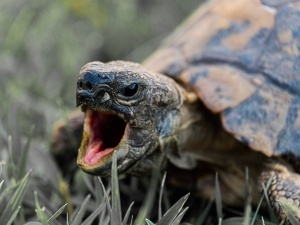
Gentle noises and the occasional bubbling in your pet’s water is normal but if these bubbles start sounding deeper and louder, if the bubbles turn into croaks, then you may start to become confused
This article looks into why your turtle may be croaking
Table of Contents
Why is my turtle croaking?
Toads are known to croak, frogs too, but turtles not so much. If your pet turtle suddenly starts doing this then you may think that something is going on with your pet, or, that there is something that your pet is trying to tell you, but fear not, this article will help you figure out what.
Here is why your turtle may be croaking:
Mating season:
Mating season brings up a variety of changes in your pet, one such change is a change in the animal’s vocalizations. These animals will croak during the mating season.
The males will croak to attract mates, and both the males and females will croak to communicate with each other.
What to do:
This is normal behavior and isn’t something to worry about.
As long as the animals are healthy and happy at this time, and as long as the animals aren’t showing any signs of distress along with the croaking, then the animals will be fine.
Stress:
Another reason for the croaking in your pet turtle is stress. Stress changes this animal’s behavior, a stressed turtle may start to isolate itself, not want to eat as much, and may suddenly start croaking.
Reasons for stress developing in your pet include a change in the animal’s environment, other turtles bullying the turtle, being handled by humans, and loud noises.
What to do:
Calming the turtle down should help stop the croaking, you can do this by leaving the animal in a quiet, dimly lit, or dark room.
Putting all the elements of its enclosure back in place, not handling the animal, and removing any bully turtles will also help to calm the animal and help with the croaking.
Also, avoid making loud noises or sudden movements around the turtle.
Fighting over territory:
Another reason why a turtle may be croaking may be because a new turtle has entered its territory. These animals are solitary animals and don’t like other turtles coming into their space.
The dominant turtle may croak to ward off other turtles who are in its territory.
What to do:
You may need to get a bigger enclosure, one that can accommodate both of the turtles, or, you may need to get each turtle its enclosure, the latter option is recommended.
Doing this will ensure that each animal feels as though it has its own space.
Respiratory tract infection:
Another reason why your pet turtle may be croaking may be because the animal has a respiratory tract infection.
Other signs of this type of infection that you should look out for in your turtle include puffy ears and eyes, lethargy, bubbles at the nose or mouth, and a lack of appetite
What to do:
It is generally recommended that turtles with infections be seen by a vet, the vet will be able to examine the animal, run tests on your pet, and then diagnose and treat your pet with antibiotics.
If you enjoyed this article then you may also be interested in other turtle/tortoise related articles. Here are some articles that you may be interested in: Why Is My Turtle Not Eating Vegetables?, Why Is My Turtle Just Lying There, Why Is My Turtle Going Crazy In Tank, Why Is My Turtle Closing Its Eyes, Why Does My Turtle Just Sit There, Why Is My Turtle Filter Making Noise?, Why Is My Turtle Filter Making Bubbles?, Why Is My Turtle Drooling?, Why Is My Turtle Cold?

